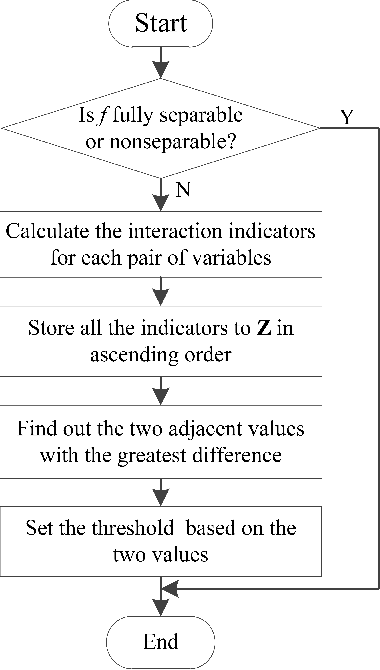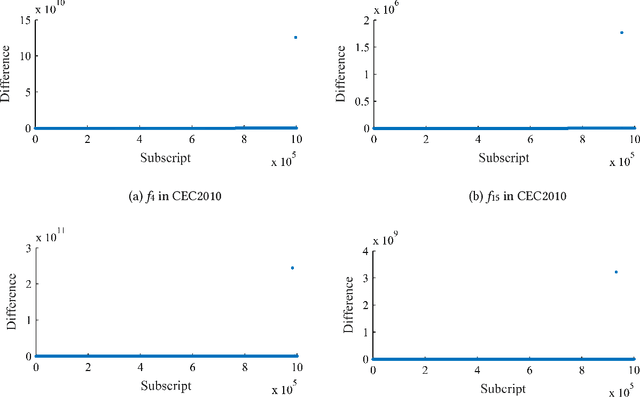Bei Pang
Niching an Archive-based Gaussian Estimation of Distribution Algorithm via Adaptive Clustering
Mar 01, 2018



Abstract:As a model-based evolutionary algorithm, estimation of distribution algorithm (EDA) possesses unique characteristics and has been widely applied to global optimization. However, traditional Gaussian EDA (GEDA) may suffer from premature convergence and has a high risk of falling into local optimum when dealing with multimodal problem. In this paper, we first attempts to improve the performance of GEDA by utilizing historical solutions and develops a novel archive-based EDA variant. The use of historical solutions not only enhances the search efficiency of EDA to a large extent, but also significantly reduces the population size so that a faster convergence could be achieved. Then, the archive-based EDA is further integrated with a novel adaptive clustering strategy for solving multimodal optimization problems. Taking the advantage of the clustering strategy in locating different promising areas and the powerful exploitation ability of the archive-based EDA, the resultant algorithm is endowed with strong capability in finding multiple optima. To verify the efficiency of the proposed algorithm, we tested it on a set of well-known niching benchmark problems and compared it with several state-of-the-art niching algorithms. The experimental results indicate that the proposed algorithm is competitive.
A Global Information Based Adaptive Threshold for Grouping Large Scale Global Optimization Problems
Mar 01, 2018



Abstract:By taking the idea of divide-and-conquer, cooperative coevolution (CC) provides a powerful architecture for large scale global optimization (LSGO) problems, but its efficiency relies highly on the decomposition strategy. It has been shown that differential grouping (DG) performs well on decomposing LSGO problems by effectively detecting the interaction among decision variables. However, its decomposition accuracy depends highly on the threshold. To improve the decomposition accuracy of DG, a global information based adaptive threshold setting algorithm (GIAT) is proposed in this paper. On the one hand, by reducing the sensitivity of the indicator in DG to the roundoff error and the magnitude of contribution weight of subcomponent, we proposed a new indicator for two variables which is much more sensitive to their interaction. On the other hand, instead of setting the threshold only based on one pair of variables, the threshold is generated from the interaction information for all pair of variables. By conducting the experiments on two sets of LSGO benchmark functions, the correctness and robustness of this new indicator and GIAT were verified.
Enhancing Cooperative Coevolution for Large Scale Optimization by Adaptively Constructing Surrogate Models
Mar 01, 2018


Abstract:It has been shown that cooperative coevolution (CC) can effectively deal with large scale optimization problems (LSOPs) through a divide-and-conquer strategy. However, its performance is severely restricted by the current context-vector-based sub-solution evaluation method since this method needs to access the original high dimensional simulation model when evaluating each sub-solution and thus requires many computation resources. To alleviate this issue, this study proposes an adaptive surrogate model assisted CC framework. This framework adaptively constructs surrogate models for different sub-problems by fully considering their characteristics. For the single dimensional sub-problems obtained through decomposition, accurate enough surrogate models can be obtained and used to find out the optimal solutions of the corresponding sub-problems directly. As for the nonseparable sub-problems, the surrogate models are employed to evaluate the corresponding sub-solutions, and the original simulation model is only adopted to reevaluate some good sub-solutions selected by surrogate models. By these means, the computation cost could be greatly reduced without significantly sacrificing evaluation quality. Empirical studies on IEEE CEC 2010 benchmark functions show that the concrete algorithm based on this framework is able to find much better solutions than the conventional CC algorithms and a non-CC algorithm even with much fewer computation resources.
Surrogate Model Assisted Cooperative Coevolution for Large Scale Optimization
Feb 27, 2018



Abstract:It has been shown that cooperative coevolution (CC) can effectively deal with large scale optimization problems (LSOPs) through a divide-and-conquer strategy. However, its performance is severely restricted by the current context-vector-based sub-solution evaluation method since this method needs to access the original high dimensional simulation model when evaluating each sub-solution and thus requires many computation resources. To alleviate this issue, this study proposes a novel surrogate model assisted cooperative coevolution (SACC) framework. SACC constructs a surrogate model for each sub-problem obtained via decomposition and employs it to evaluate corresponding sub-solutions. The original simulation model is only adopted to reevaluate some good sub-solutions selected by surrogate models, and these real evaluated sub-solutions will be in turn employed to update surrogate models. By this means, the computation cost could be greatly reduced without significantly sacrificing evaluation quality. To show the efficiency of SACC, this study uses radial basis function (RBF) and success-history based adaptive differential evolution (SHADE) as surrogate model and optimizer, respectively. RBF and SHADE have been proved to be effective on small and medium scale problems. This study first scales them up to LSOPs of 1000 dimensions under the SACC framework, where they are tailored to a certain extent for adapting to the characteristics of LSOP and SACC. Empirical studies on IEEE CEC 2010 benchmark functions demonstrate that SACC significantly enhances the evaluation efficiency on sub-solutions, and even with much fewer computation resource, the resultant RBF-SHADE-SACC algorithm is able to find much better solutions than traditional CC algorithms.
 Add to Chrome
Add to Chrome Add to Firefox
Add to Firefox Add to Edge
Add to Edge